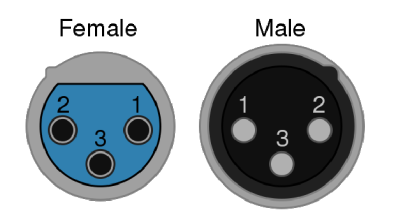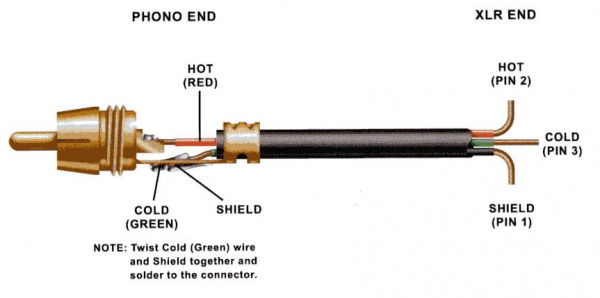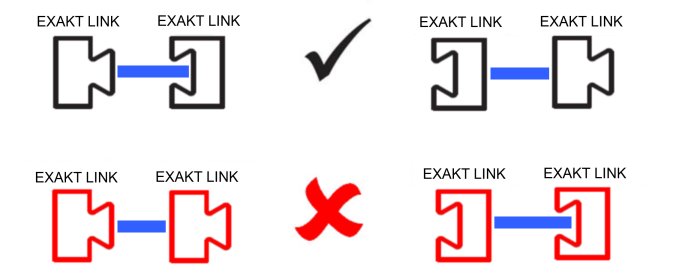Difference between revisions of "Cables & terminations"
m (→RCA/Phono) |
m (→XLR) |
||
| Line 56: | Line 56: | ||
|width="600px"|'''4 Vrms''' | |width="600px"|'''4 Vrms''' | ||
|- | |- | ||
| − | ||<br>||Typical Output Impedance: ||''' | + | ||<br>||Typical Output Impedance: ||'''300 Ω''' |
|- | |- | ||
|| | || | ||
Revision as of 08:54, 4 October 2022
The typical termination standard between Linn products are:
RCA/Phono
- Inputs
| Input sensitivity: | Selectable: 1 / 2 / 4 Vrms | |
| Typical Input impedance: | typically 10 kΩ |
- Outputs
| Analogue Output: | 2 Vrms | |
| Typical Output Impedance: | 300 Ω | |
| RCA Output Coupling: | Transformer - Klimax DS/1 onwards and all Klimax DSM | |
| Direct - all other products |
XLR
- Inputs
| Input sensitivity: | Selectable: 2 / 4 / 8 Vrms | |
| Typical Input impedance: | 7.8kΩ | |
| XLR Coupling: | Direct (some Klimax products have the option of Transformer or Direct) |
- Outputs
| Analogue Output: | 4 Vrms | |
| Typical Output Impedance: | 300 Ω | |
| XLR Output Coupling: | Direct - Majik/Akurate/Selekt/Klimax DSM (2021 variant) | |
| Transformer - Klimax up to 2018 variant. |
- XLR pin outs
- 1 - Shield
- 2 - HOT (white)
- 3 - COLD (Blue)
- Converting XLR to/from Phono/RCA
Audio Transformer
- The audio transformer is there to electrically either isolate the Klimax DSM from the connected amplifier or from the connected source.
- The transformer can help to eliminate ground noise in some situations, such as mains electrical without a mains earth.
- Some people prefer the sound with this transformer enabled, some with it disabled, so we have provided the option.
SPDIF
Linn DS/DSM/Hub Output configuration: Fixxed level, there is NO volume control even in Post Eq mode.
Linn DS/DSM/Hub Input configuration: 32kHz, 44.1kHz, 48kHz, 88.2kHz, 96kHz, 176.4kHz, 192kHz : 16bit and 24bit streams
- Inputs
| Input voltage | 0.3V (when terminated with 75Ω ) | |
| Input impedance: | 75Ω |
- Outputs
| Min Input voltage | 0.5V rms (when terminated with 75Ω ) | |
| Input impedance: | 75Ω |
Exakt Cables
ALL FOUR pairs of the cables are used in the Exakt-Link cable. This is NOT an ethernet transport cable but an Exakt transport cable.
- These pairs are used to transmit the
- audio data,
- power triggers and a
- master timing control to ensure that the audio from all channels are in perfect sync.
The Exakt-link has been designed, and tuned, to operate with the CAT-5 cable electrical specifications for signal timings. There have been NO changes to this design for any other CAT, (category), cable standards. (updated 2024)
- We recommend using the 100Base-T4 / 568B ethernet cable pairing
- Exakt Link uses readily available network cables:
- CAT 5/5e UTP/FTP
- CAT 6/6a UTP/FTP
- Note:
- There is no change in the audio performance of the Exakt Link between Cat 5 or Cat 6 Cables.
- Cat-7 and Cat-8 cables may not work reliably with an Exakt system..
- Cat-7 & Cat-8 are designed for much higher data speeds, (with different cable twist rates and incorporating extra shielding).
- Using Cat-7/8 specification cables: (We have performed a lot of testing to confirm this.)
- Will degrade the "master timing control" and reduce audio performance.
- it will have more transport data losses & recovery. (Cat-7 or Cat-8 cable are designed for much higher data rates).
- and the presence of the additional shielding, this will also reduce the usable cable length due to the lower Exakt-link data and "master timing control" attenuation.
Typical Ethernet 100Base-T length restrictions guide:
- Patch cable < 30M
- Solid core cable < 100M
EXAKT-LINK CANNOT be used with:
- Ethernet Network Routers,
- Ethernet Network Switches,
- Ethernet Isolators,
- Ethernet conditioners,
- HomePlugs/Ethernet-over-Mains devices
- WLAN bridges etc
Exakt-Link can ONLY be a CAT5/6 cable from Exakt socket to Exakt socket
EXAKT LINK terminations
- The cables are paired up using OUT > IN style connections.
- Any Linn product with these sockets can be linked together. This means you can link a Klimax DS/2 to a Majik ExaktBox-I and have a fully working Exakt system


